Medical expert of the article
New publications
Preparations
Candida suppositories
Last reviewed: 03.07.2025

All iLive content is medically reviewed or fact checked to ensure as much factual accuracy as possible.
We have strict sourcing guidelines and only link to reputable media sites, academic research institutions and, whenever possible, medically peer reviewed studies. Note that the numbers in parentheses ([1], [2], etc.) are clickable links to these studies.
If you feel that any of our content is inaccurate, out-of-date, or otherwise questionable, please select it and press Ctrl + Enter.
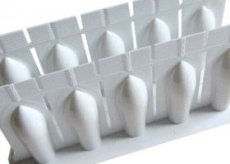
Candidiasis suppositories are a series of medications that allow you to cure thrush in a short time. Let's consider the most effective suppositories for candidiasis, their principle of action, main indications and instructions for use.
The action of suppositories is based on the deep penetration of the active substance into the mucous membrane. Due to this, the pathogen is destroyed, inflammation and general symptoms of candidiasis are reduced. Today, the pharmaceutical market offers many different antifungal suppositories. The drugs differ in their effectiveness, cost, possible side effects and contraindications. There are suppositories that are effective in severe forms of candidiasis, and some are used to prevent thrush or are part of the therapeutic complex of the disease.
In order to choose truly effective suppositories for candidiasis, you need the drug to which the fungus is sensitive. To do this, you need to see a doctor and take smears. Based on the results of bacterial culture, the doctor determines the resistance, resistance and sensitivity of the fungus to certain drugs. This is explained by the fact that with chronic or frequently recurring thrush, treatment may not bring the desired results, since the fungus becomes resistant to the drug.
- If candidiasis has just appeared or is not in a very advanced form, then Livarol, Ginezol, Clotrimazole suppositories can be used for treatment. These drugs quickly and reliably relieve the symptoms of thrush without causing allergic reactions. In addition, the suppositories have a preventive effect.
- In advanced or chronic thrush, stronger suppositories are used for treatment. Ketoconazole and Nystatin belong to this category of drugs. The advantage of these suppositories is that they are effective in treating the most advanced stages of candidiasis. But it is contraindicated to use such suppositories on your own. Since a strong therapeutic effect can cause vaginal dysbiosis. After such treatment, you will have to restore the microflora with the help of another treatment.
- Strong suppositories for thrush are prescribed with probiotics, that is, drugs containing beneficial bacteria to maintain normal microflora of the body. In addition, suppositories with a pronounced therapeutic effect are contraindicated for pregnant women.
- But vaginal suppositories Ovulum or Macmiror are used in combination with other suppositories, as they have an antiseptic effect. Thanks to this, it is possible to cure not only thrush, but also a number of other infections that provoke the disease.
Indications for the use of suppositories for candidiasis
Indications for the use of suppositories for candidiasis are based on the action of a particular drug. First of all, it should be noted that both partners must undergo treatment, since in men thrush can be asymptomatic. Due to the lack of treatment in a man, in a woman candidiasis becomes chronic and constantly recurs.
As a rule, candidiasis indicates the presence of sexually transmitted infections. The disease can lead to bacterial vaginosis and gardnerellosis. Depending on the symptoms, chronic or acute process, the therapy differs in the duration of treatment. For the treatment of candidiasis in some patients, one suppository is enough, but for chronic thrush in others, it is necessary to undergo a full course of treatment.
The main indications for the use of suppositories for candidiasis:
- Treatment and prevention of diseases caused by Candida fungi.
- Treatment of candidiasis of mucous membranes and internal organs.
- Prevention of the development of candidiasis with long-term use of antibiotics, penicillin, oral medications and tetracycline antibiotics.
Vaginal suppositories for candidiasis
Vaginal suppositories for candidiasis are effective medications that allow you to quickly and effectively get rid of the symptoms of a fungal disease. But it is better to use vaginal suppositories after consultation and examination by a gynecologist. Since the doctor will prescribe a remedy that is safe for your body, will cure thrush and will not have side effects.
The following vaginal suppositories are used to treat candidiasis:
- Combined drugs for local use.
- Antifungal drugs.
- Antimicrobial drugs for local use.
If the treatment is carried out with antifungal drugs, then after the therapy, the woman needs to restore the normal microflora of the vagina. Beneficial lactobacilli will protect against relapses of the disease and foreign microorganisms.
Some women find that using vaginal suppositories for candidiasis does not bring the desired result. There are several reasons for this phenomenon:
- The disease develops resistance to some drugs, which makes the treatment useless. Resistance to drugs can occur due to an unfinished course of treatment or a low dosage that did not kill the fungus and gave it the opportunity to adapt to the drug.
- Incorrect self-medication is another reason for the ineffectiveness of the suppositories used. Many women suffering from thrush self-medicate. For this purpose, medicinal tampons and drugs to boost immunity can be used. But it is better to use proven drugs, that is, vaginal suppositories.
Vaginal suppositories differ in their active ingredients, treatment periods and therapeutic range. A number of drugs are prohibited for use during pregnancy and menstruation. For treatment, you need to choose suppositories that will not cause a violation of the vaginal microflora, the drug will be effective not only against fungal infections, but also against mixed infections. Suppositories should not cause complications in the form of allergic reactions, have a minimum of contraindications and side effects.
Rectal suppositories for candidiasis
Rectal suppositories for candidiasis can be used in case of intestinal fungal disease or vaginal thrush. Rectal suppositories are suitable for pregnant women and for the treatment of thrush during menstruation. Let's consider several effective rectal suppositories for candidiasis.
- Viferon
A complex preparation with antiviral, antiproliferative and immunomodulatory effects. The preparation is used to treat urogenital infections, infectious and inflammatory diseases, and intrauterine infections. Suppositories are effective in treating candidiasis, bacterial vaginosis, herpes infection, chlamydia, ureaplasmosis and a number of other viral infections.
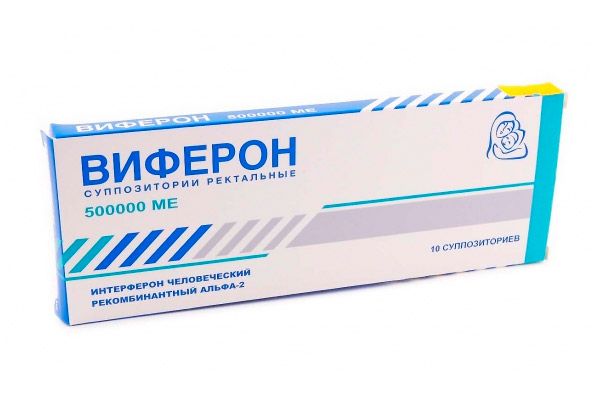
Rectal suppositories are used as prescribed by a doctor. As a rule, for the treatment of candidiasis, patients are prescribed one suppository twice a day. The course of treatment lasts from 5 to 14 days. In rare cases, Viferon causes allergic skin reactions that disappear 72 hours after discontinuing the drug. Suppositories are contraindicated for use in case of individual intolerance to the active substance or components of the drug.
Viferon is approved for use in treating candidiasis in pregnant women, but only from the 14th week, but there are no contraindications for using suppositories during lactation. To date, there have been no cases of drug overdose. Suppositories are dispensed from pharmacies without a doctor's permission.
- Nystatin
A drug effective against pathogenic fungi, especially Candida fungi. Despite its effectiveness, the drug is poorly absorbed, so the bulk of the suppository is excreted with feces. Nystatin is used to treat and prevent candidiasis of the mucous membranes of the vagina, mouth, skin, and internal organs. The drug is also effective in preventing candidiasis, especially with long-term use of antibiotics, tetracycline drugs, and penicillin.
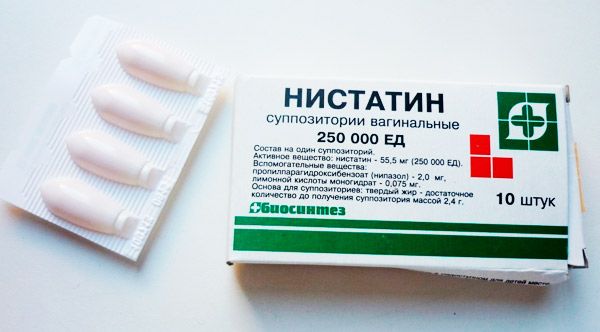
Rectal suppositories are used twice a day, inserted deep into the rectum. The course of treatment lasts from 10 to 14 days. Nystatin is low-toxic, so it does not cause side effects. The drug is contraindicated for patients with individual sensitivity to the components of the drug, as this can cause nausea and vomiting, chills, and increased body temperature. Rectal suppositories for candidiasis are used only as prescribed by a doctor.
- Pimafucin
An antifungal drug with the active ingredient natamycin (macrolide antidiotic). The drug has a broad spectrum of action and is sensitive to Candida fungi. Rectal suppositories are prescribed for the treatment of fungal diseases of the gastrointestinal tract, vaginal candidiasis, and candidal vulvovaginitis. The drug is used in the complex therapy of fungal diseases.
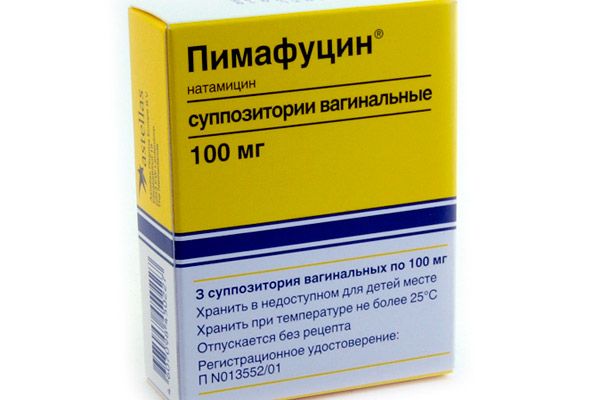
Suppositories are placed at night, usually one suppository per day. The duration of treatment is determined individually for each patient, but on average the course of treatment lasts from 3 to 6 days. After the main course of treatment, a preventive course is carried out 3-4 days after the disappearance of candidiasis symptoms. Side effects of the drug are manifested in the form of itching and allergic reactions. Suppositories are contraindicated for use in case of hypersensitivity to the components of Pimafucin. The drug is contraindicated for the treatment of candidiasis in pregnant women.
Release form
The form of release of suppositories for candidiasis is vaginal and rectal suppositories. Suppositories differ in their shape and color. In addition, suppositories differ in the amount of active substance. Each suppository has individual packaging, which facilitates the process of their storage and use. Due to the pointed end, suppositories are easily inserted both into the vagina and rectally.
The form of release of suppositories for the treatment of candidiasis accelerates the recovery process. This is explained by the fact that the active substances of the drug act directly on the affected mucous membrane. For greater effectiveness, before using suppositories, it is necessary to empty the bladder and intestines and only then insert the suppository, and the deeper, the better.
 [ 4 ]
[ 4 ]
Pharmacodynamics of suppositories for candidiasis
Pharmacodynamics of suppositories for candidiasis are the processes that occur with the active substance of the drug after its use. Let's consider the pharmacodynamics of suppositories for candidiasis using the example of intravaginal suppositories Livarol.
The active substance of the drug is ketoconazole. The substance is an antimycotic of the imidazoledioxolane group, has a fungistatic and fungicidal effect. The drug is active against yeast-like fungi Candida, as well as Pityrosporum, Trichophyton spp., Streptococcus spp. and Staphylococcus spp.
Suppositories are used to treat acute and recurrent vaginal candidiasis and to prevent it in cases of weakened immunity when using antibacterial drugs that disrupt the natural microflora of the vagina.
Pharmacokinetics of suppositories for candidiasis
Pharmacokinetics of suppositories for candidiasis are the processes of absorption, distribution, metabolism and excretion of the drug after use. Let's consider pharmacokinetics using the example of Pimafucin suppositories. Suppositories are intended for intravaginal administration, quickly dissolve at body temperature. Suppositories form a voluminous foaming mass, which evenly distributes the active substance along the walls of the vagina.
The drug contains cetyl alcohol, which can cause allergic reactions. Therefore, before using suppositories, it is recommended to consult a gynecologist. Pimafucin suppositories are contraindicated for use during menstruation and sexual activity during treatment.
After oral administration, the suppositories dissolve and have a fungicidal effect. The drug disrupts the integrity of the membranes of harmful microorganisms, which leads to the death of the fungus. The drug is excreted by the kidneys within 6-8 hours after use.
Treatment of candidiasis with suppositories
Treatment of candidiasis with suppositories is a local therapy of fungal disease. It is necessary to approach the treatment process comprehensively. Suppositories and any other drugs for candidiasis are selected individually for each woman. The advantage of suppositories over other forms of drugs is that they eliminate the signs of the disease in the first days of use. But after the disappearance of unpleasant symptoms, the course of treatment must still be continued. Since unfinished treatment can cause chronic candidiasis, which is quite difficult to cure. Treatment of candidiasis with suppositories allows you to get rid of not only the symptoms of thrush, but also completely eliminate the yeast fungus.
- Some medications for candidiasis should be used with special caution, as they cause a number of side effects and disrupt the vaginal microflora. Such medications include: Polygynax and Terzhinan suppositories. Ketoconazole suppositories are effective for any form of candidiasis. But due to many side effects and contraindications, they are not used often.
- Nystatin suppositories fight only fungal infections, but the drug is inactive against bacteria and viruses. This drug is not effective in the treatment of chronic thrush, since Candida fungi develop immunity to the drug. Long-term use of Nystatin leads to disturbances in the vaginal microflora. Nystatin is recommended to be used simultaneously with Macmiror suppositories, as they enhance the effect of the former.
- Treatment of thrush using suppositories can be carried out with broad-spectrum drugs. Such drugs include Ginezol. Suppositories are used to treat recurrent thrush. Both partners must undergo treatment with this drug.
It is recommended to use suppositories for candidiasis before going to bed. The suppository should be placed deep into the vagina. Body temperature will allow the suppository to melt, and the active substances will penetrate the mucous membrane, providing a therapeutic effect and eliminating the symptoms of the disease.
Candles for intestinal candidiasis
Candles for intestinal candidiasis are drugs that help eliminate intestinal infection caused by harmful microorganisms. Intestinal infections cause severe pain and discomfort. Intestinal candidiasis is a type of dysbacteriosis caused by opportunistic fungi. Each person has these fungi in the intestines, but in small quantities, without causing harm to the body.
Healthy intestinal microflora independently produces substances that prevent the proliferation of fungi and have antibacterial activity. Intestinal candidiasis occurs when the immune system is unable to prevent the proliferation of harmful microorganisms or there are too many of them. The causative agents of candidiasis are yeast-like fungi Candida, of which there are more than 170 species. Fungi are everywhere: in fruits, vegetables, household utensils, soil and, of course, in the human body.
- To treat intestinal candidiasis, it is necessary to use medications that are not absorbed from the intestinal cavity. The ideal option is rectal and vaginal suppositories. Suppositories for intestinal candidiasis should be prescribed by a doctor, indicating the dosage and duration of use. In addition, it is the doctor who will be able to monitor the effectiveness of the treatment, since some patients experience allergic and dyspeptic disorders. Intestinal candidiasis is treated with the following suppositories: Pimafucin, Nystatin and antifungal antibiotics in tablets.
- Pimafucin is an effective antifungal drug that is approved for use during pregnancy and lactation. Treatment of intestinal candidiasis is long-term and may take more than one year of therapy.
- The use of suppositories for candidiasis helps prevent the development of a generalized form of the disease. The main criterion for recovery is a negative fungal culture test and, of course, the absence of disease symptoms. In some cases, antifungal treatment is used to achieve a lasting therapeutic effect.
In addition to the main therapy, the patient undergoes additional symptomatic treatment. For this purpose, antispasmodics, laxatives, absorbents, drugs to enhance the protective properties of the immune system, and multivitamins are used. Prevention of intestinal candidiasis is mandatory. Prevention is the complete exclusion of factors that provoke the development of candidiasis. Do not forget about timely visits to doctors at the first symptoms of the disease. It is mandatory to follow a diet, that is, a balanced diet, which will prevent the occurrence of intestinal candidiasis.
Names of suppositories for candidiasis
The names of suppositories for candidiasis help you navigate when choosing a medicine. Knowing the name of the suppositories, you can always read patient reviews about the effectiveness of their use or talk to your doctor about the chosen medicine.
Read also:
When choosing medications for thrush, you need to know that there are single-component and multi-component suppositories.
- Single-component drugs contain one antifungal substance; such drugs include Clotrimazole, Nystatin, Natamycin, Ketoconazole, Gyno-Daktanol, Zalain, Ginezol7 suppositories.
- The second group of drugs for local treatment of candidiasis are combined or multicomponent suppositories. They are effective in treating both thrush and other sexually transmitted infections. Such drugs include: Livarol, Terzhinan, Klion-D, Polygynax. The main advantage of suppositories is a wide range of action. But such drugs are contraindicated for pregnant women in the first trimester and during lactation.
In order for the treatment of candidiasis to be truly effective and end in a stable remission of the disease or a complete recovery, it is necessary to choose the right drug. Let's consider the most effective suppositories for candidiasis:
- Livarol
The active substance of the suppositories is ketoconazole, an antibiotic from the imidazoledioxolane group. The drug has a fungistatic and fungicidal effect. The suppositories are active against yeast-like fungi Candida spp., Pityrosporum spp., as well as dermatophytes, staphylococcal and streptococcal infections.
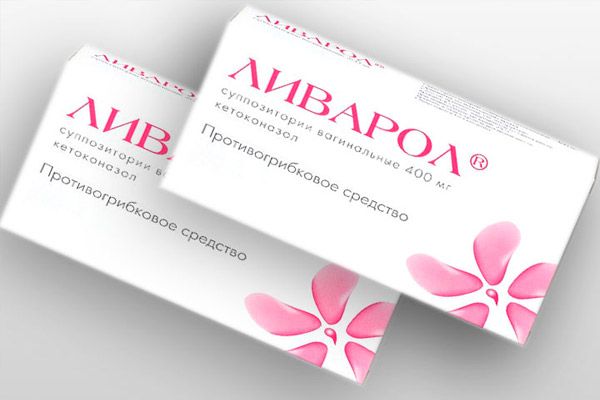
Livarol is used to treat recurrent vaginal candidiasis, acute thrush and to prevent fungal infections in cases of a weakened immune system. The course of treatment lasts from 3-5 days, one suppository is used before bedtime. And in case of chronic candidiasis, treatment can last up to 10 days. The drug is contraindicated for use in case of allergic reactions to the active substance of suppositories and in the first trimester of pregnancy. Side effects include nausea, dizziness, irritation and burning of the genitals.
- Ginezol 7
Suppositories contain the active substance miconazole, which has antifungal activity. The drug has an antibacterial effect on gram-positive microorganisms. Suppositories quickly eliminate the painful symptoms of candidiasis (itching, burning, redness). The drug has limited systemic absorption. 8 hours after use, 90% of the drug remains in the vagina.
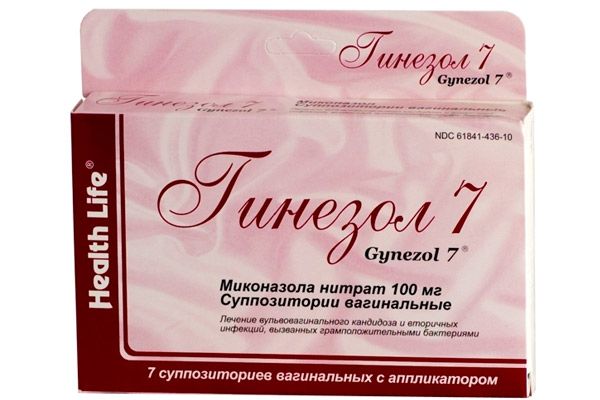
Suppositories are used to treat vulvovaginal candidiasis and secondary infections. The duration of treatment is individual for each patient and can range from 7 to 14 days of suppository use. Suppositories for candidiasis are placed twice a day, in the morning and in the evening, until the symptoms of the disease completely disappear. The drug is contraindicated for use during lactation and pregnancy. Side effects are rare and usually manifest themselves as minor allergic reactions. Suppositories are contraindicated for use in case of hypersensitivity to the components of the drug and vaginal herpes.
- Clotrimazole
A local antifungal drug from the group of imidazole derivatives. Clotrimazole has a broad spectrum of action, which covers almost all pathogenic fungi that cause infections. Suppositories are effective in the treatment of dermatophytes and dermatophytic fungi, blastomycosis and mold fungi, actinomycetes Nocardia. Small doses of the drug have a fungistatic effect, and large doses have a fungicidal effect.
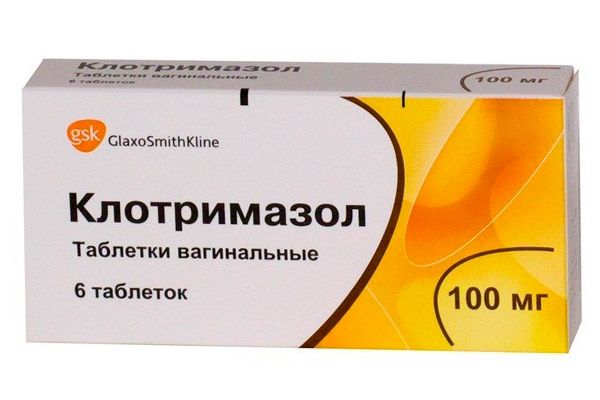
Suppositories have antimycotic, antibacterial, antiamoebic and antitrichomonal effects. The main indications for use of the drug: urogenital candidiasis, skin mycoses, blastomycetes, mold fungi, secondary skin infection. The course of treatment can last up to 4 weeks, the drug is used 1-2 times a day. Side effects are manifested in the form of allergic reactions. Suppositories are contraindicated for use in case of individual intolerance to the components of the drug and during the first trimester of pregnancy.
- Terzhinan
A complex antifungal drug for the treatment of gynecological diseases. The drug has antibacterial activity, is active against anaerobic flora, and has a trichomonacidal effect. Terzhinan suppositories are used to treat candidiasis, vaginitis, and vaginosis of bacterial etiology. The drug is used to prevent purulent-inflammatory complications before and after surgical interventions in the pelvic area.
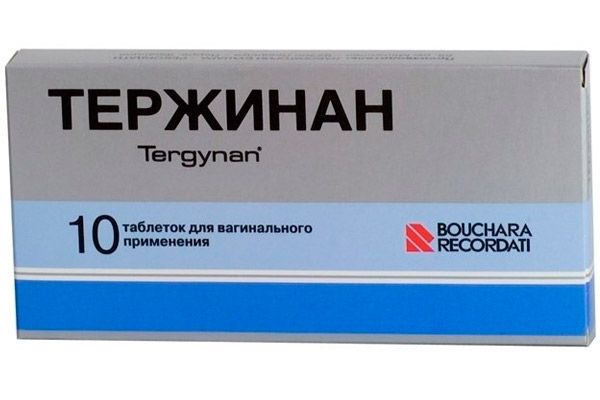
Vaginal tablets are inserted deep into the vagina. The duration of continuous treatment is 10 days, one suppository is used per day. Side effects of the drug are manifested as allergic reactions that go away on their own. Terzhinan is not used in case of intolerance to the components of the drug and in the first trimester of pregnancy.
- Viferon
A medicinal product with immunomodulatory, antiviral and antiproliferative properties. Suppositories are used to treat various infectious and inflammatory diseases. Suppositories are effective in the treatment of candidiasis, herpes, chlamydia and a number of other diseases. The dosage of suppositories is selected by the attending physician, individually for each patient. When treating candidiasis, the course of treatment takes from 5 to 10 days, and a preventive course of treatment is carried out 5 days after the main one.

Side effects of suppositories cause skin allergic reactions, which disappear 72 hours after discontinuing the drug. Suppositories are contraindicated for use in the first trimester of pregnancy and in case of individual intolerance to the components of the drug.
- Zalain
Antifungal drug for local use. The active substance of suppositories is sertaconazole. The drug has a fungicidal and fungistatic effect on a wide range of yeasts and fungi. Due to the complex effect on the cells of harmful microorganisms, the number of relapses of the disease decreases. Sertaconazole has antifungal activity against a wide range of fungi. When applied locally, the active substance is not absorbed into the systemic bloodstream.
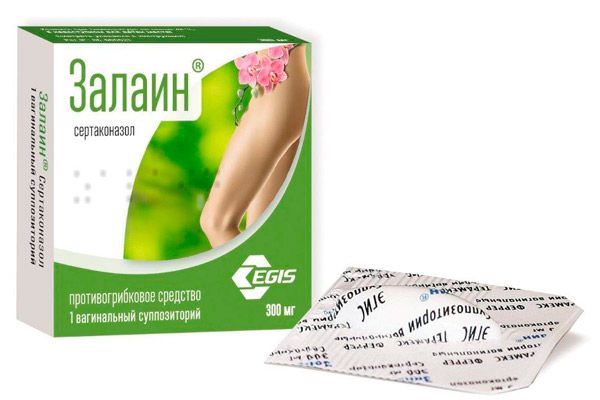
Vaginal suppositories are used for local treatment of infectious lesions of the vaginal mucosa. The drug is used to treat vaginal candidiasis and mixed vaginal infections. Suppositories are used once a day, before bedtime. The duration of treatment is individual for each patient and is determined by the attending physician. In addition to the main course of treatment, a preventive course must be carried out after seven days. The drug does not cause side effects, as it is low-toxic. Suppositories are contraindicated during pregnancy and in case of individual intolerance to the components of the drug.
- Lomexin
An effective drug with antifungal and antibacterial action. The drug is active against fungal infections, pathogenic yeast fungi, mold fungi and gram-positive bacteria. Indications for use of the drug: genital candidiasis, dermatomycosis, cutaneous candidiasis, mycosis, vaginal trichomoniasis.
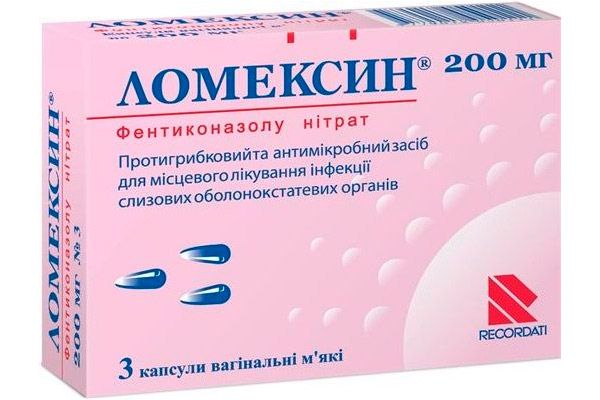
Place suppositories before bedtime, one every three days, for 10 days. A repeat course of treatment can be carried out after 2 weeks. Side effects of the drug are manifested in the form of allergic reactions and burning. Suppositories are contraindicated for use in case of individual intolerance to the components of the drug and during pregnancy.
Method of administration and dosage
The method of application and dosage of drugs for the treatment of candidiasis are determined by the attending physician. Only a gynecologist can select effective suppositories, the necessary dosage and duration of treatment. The dosage depends on the symptoms of thrush and its type. If we are talking about intestinal candidiasis, then the treatment is quite long and the use of one suppository will not help in eliminating the symptoms of the disease. But with vaginal candidiasis, even one suppository of an effective drug can stop the fungal disease. As a rule, the course of treatment lasts from 3 to 14 days. 1 or 2 suppositories can be used per day, depending on the symptoms of thrush.
The method of application depends on the type of suppositories, i.e. rectal or vaginal suppositories. Rectal suppositories are inserted into the rectum, and vaginal suppositories into the vagina. It is recommended to insert suppositories in a lying position or other comfortable position. The suppository must be inserted deep enough, both into the rectum and into the vagina. It is most convenient to use the drug before bedtime. Using suppositories before bedtime allows you to achieve maximum efficiency. The medicinal substances are maximally absorbed into the mucous membrane and help to avoid trouble with clothes smeared with melted suppository. After inserting the suppository, it is recommended to cover the vagina with a cotton swab. This will prevent the melted suppository from leaking out. As a rule, the active substances of the suppositories are absorbed within 30 minutes.
It is necessary to use suppositories for candidiasis in accordance with the established course of treatment. The symptoms of the disease may disappear within a few days after using the suppositories. But it is impossible to completely cure the disease in such a short period of time. Abandoned treatment halfway leads to the fact that candidiasis takes a chronic form and can even lead to the fungus's tolerance to the drugs used.
 [ 10 ]
[ 10 ]
Using Candida Suppositories During Pregnancy
The use of suppositories for candidiasis during pregnancy is a very relevant issue, since many women face this problem due to a weakened immune system. Most drugs are prohibited for use by pregnant women, since there is no reliable data on the safety of drugs for the fetus. Suppositories for thrush during pregnancy are most preferable, in contrast to tablets and solutions. As a rule, pregnant women are prescribed Nystatin or Pimafucin, since they can be used from the first trimester. Another effective drug is Clotrimazole suppositories, but they are used with extreme caution, since they are prohibited in the first trimester and undesirable in the following ones.
Among the local medications for candidiasis during pregnancy, women are prescribed:
- Pimafucin.
- Nystatin.
- Primafungin.
- Vagikal.
These suppositories are allowed to be used from the first trimester, as they are safe for both the expectant mother and her baby. In addition to the use of suppositories, candidiasis is treated with combination drugs. These include the drug complex Macmirr, with the active ingredients nitstatin and nifuratel. Pregnant women are also prescribed Terzhanin, but it can only be used from the second period of pregnancy.
Contraindications to the use of suppositories for candidiasis
Contraindications to the use of suppositories for candidiasis directly depend on the active substances included in the suppositories. First of all, it is worth noting that any vaginal suppositories for candidiasis are contraindicated for use during menstruation. If treatment cannot be stopped, then the woman is prescribed rectal suppositories.
The main contraindication to the use of suppositories for candidiasis is individual intolerance to the components of the drug, and especially the active substances. If the patient has allergic reactions or hypersensitivity to at least one component, the drug is not used. During therapy, it is contraindicated to wear synthetic and tight underwear. It is necessary to follow all the rules of intimate hygiene, not to use chemicalized and scented pads and intimate hygiene products that worsen the symptoms of the disease.
Side effects of suppositories for candidiasis
Side effects of suppositories for candidiasis are rare, since suppositories are classified as topical medications. But manufacturers warn patients that long-term treatment exceeding the recommended dose or high dosages of the drug can cause a number of side effects.
Most suppositories are low-toxic, so side effects appear in the form of minor allergic reactions on the skin: itching, hyperemia, rash. But there are also toxic suppositories, the use of which can cause not only adverse allergic reactions, but also nausea, vomiting, chills, diarrhea, increased body temperature, etc. To eliminate side effects, it is recommended to reduce the dosage of the drug. After discontinuing the drug, all side effects disappear within 72 hours.
Overdose
Overdose of suppositories for candidiasis is unlikely, but if it does happen, the symptoms are similar to the side effects of the drug. Depending on the type of suppositories (vaginal or rectal) and the active substance (toxic, low-toxic), overdose symptoms may manifest as pain in the lower abdomen, nausea, vomiting, diarrhea, allergic reactions.
To treat an overdose, it is recommended to carry out symptomatic treatment, stop using suppositories for candidiasis or reduce the dose of the drug.
Interactions of suppositories for candidiasis with other drugs
Interaction of suppositories for candidiasis with other drugs is possible only with the permission of the attending physician. The doctor diagnoses the disease, takes smears and prescribes a course of treatment. For the treatment of candidiasis, both local treatments, i.e. suppositories, tablets, ointments, and solutions for intravenous administration can be used.
Let's consider an example of the interaction of Clotrimazole suppositories for candidiasis with other drugs. Clotrimazole suppositories are able to inhibit the action of other drugs used locally to treat fungal diseases. The drug slows down the action of polyene antibiotics, such as Nystatin and Natamycin. If Clotrimazole is used with Dexamethasone, this significantly inhibits the antifungal effect of the suppositories. And the concentrations of propyl ether of p-oxybenzoic acid enhance the antifungal properties of suppositories for candidiasis.
Storage conditions for suppositories against candidiasis
The storage conditions for suppositories for candidiasis correspond to the rules for storing any other suppositories. Suppositories must be stored in the original packaging, this will prevent deformation of the suppositories. The storage temperature should be from 15° to 25°C, but not higher, since the suppositories will melt. The drug should be stored in a place protected from sunlight and inaccessible to children. Failure to comply with the storage conditions for suppositories for candidiasis leads to the loss of the drug's antifungal properties.
Best before date
The expiration date of suppositories for candidiasis is indicated on the packaging of the drug. As a rule, vaginal and rectal suppositories are stored from 12 to 24 months. After the expiration date, the suppositories must be disposed of. The use of expired drugs does not have a therapeutic effect, but on the contrary, can lead to uncontrolled side effects.
Price of suppositories for candidiasis
The price of suppositories for candidiasis depends on the amount of active ingredients in the suppositories. That is, the higher the dosage, the more expensive the drug. Suppositories for the treatment of thrush are selected by the attending physician after examining the patient and taking tests. It is the doctor who prescribes the necessary dosage and duration of treatment. Let's consider popular suppositories for candidiasis and their approximate cost.
Name of suppositories for candidiasis Cost of the drug Nystatin from 10 UAH Clotrimazole from 15 UAH Ketoconazole from 20 UAH Klion-D from 60 UAH Polygynax from 70 UAH Zalain from 72 UAH Lomexin from 75 UAH Pimafucin from 80 UAH Terzhinan from 85 UAH Viferon from 110 UAH Natamycin from 117 UAH Gyno-Daktanol from 130 UAH Livarol from 148 UAH Ginezol 7 from 210 UAH
All the above prices are approximate and depend on the pharmacy where the suppositories are sold, the manufacturer of the drug, the number of suppositories in the package and their dosage.
Candidiasis suppositories allow you to quickly and with minimal discomfort eliminate the fungal disease. A wide pharmaceutical selection of suppositories for the treatment of thrush makes it possible to cure any form of the disease or prevent it. It is not recommended to use suppositories on your own, as this can cause uncontrolled side effects and worsen the symptoms of thrush. Only a doctor can select effective suppositories for candidiasis that will effectively cure thrush or transfer it to a stage of long-term remission.
Attention!
To simplify the perception of information, this instruction for use of the drug "Candida suppositories" translated and presented in a special form on the basis of the official instructions for medical use of the drug. Before use read the annotation that came directly to medicines.
Description provided for informational purposes and is not a guide to self-healing. The need for this drug, the purpose of the treatment regimen, methods and dose of the drug is determined solely by the attending physician. Self-medication is dangerous for your health.

